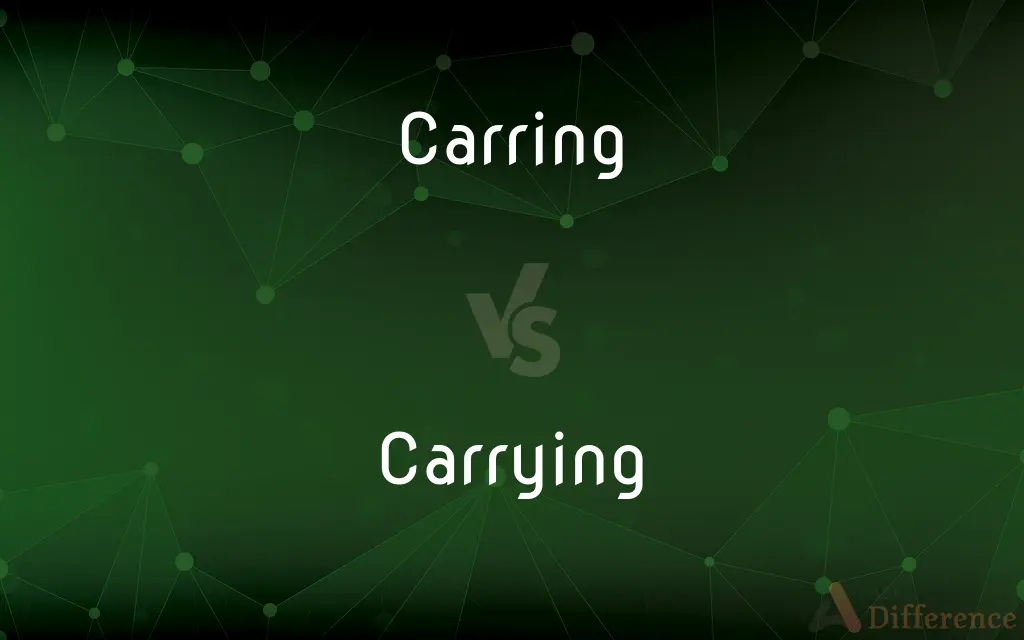Carring vs. Carrying — Which is Correct Spelling?
By Tayyaba Rehman — Updated on March 20, 2024
"Carring" is an incorrect spelling. The correct spelling is "Carrying," denoting the act of holding or transporting something.

Table of Contents
Which is correct: Carring or Carrying
How to spell Carrying?

Carring
Incorrect Spelling

Carrying
Correct Spelling
ADVERTISEMENT
Key Differences
Remember it has the same number of 'r's as "carrier" but with "ing" at the end.
Associate "carrying" with the action of "moving" – both have double consonants before “-ing.”
Think of "carry" + "ing."
Double the ‘r’ before adding ‘-ing’ to "carry."
Visualize "carrying" as "carry" with an "-ing" extension.
ADVERTISEMENT
How Do You Spell Carrying Correctly?
Incorrect: The team is carring out research on the new project.
Correct: The team is carrying out research on the new project.
Incorrect: The law prohibits carring weapons in public places.
Correct: The law prohibits carrying weapons in public places.
Incorrect: She was carring the groceries up the stairs when she dropped a bag.
Correct: She was carrying the groceries up the stairs when she dropped a bag.
Incorrect: Are you carring the keys, or did you leave them in the car?
Correct: Are you carrying the keys, or did you leave them in the car?
Incorrect: He had trouble carring the heavy suitcase.
Correct: He had trouble carrying the heavy suitcase.
Carrying Definitions
The act of holding or transporting from one place to another.
He was carrying a heavy backpack.
Bearing or possessing something on one's person.
She is carrying identification.
Transmitting or spreading, as of a disease.
Mosquitoes are responsible for carrying malaria.
Supporting or keeping something operational.
The pillar is carrying the weight of the building.
The responsibility or role of conveying something.
The pipeline is carrying water to the village.
To hold or support while moving; bear
Carried the baby in my arms.
Carrying a heavy backpack.
To move or take from one place to another; transport
A train carrying freight.
A courier carrying messages.
Chiefly Southern US To escort or accompany.
To serve as a means for the conveyance of; transmit
Pipes that carry waste water.
A bridge that carries traffic between the two cities.
To communicate; pass on
The news was carried by word of mouth to every settlement.
To express or contain
Harsh words that carried a threat of violence.
To have (something) on the surface or skin; bear
Carries scars from acne.
To hold or be capable of holding
The tank carries 16 gallons when full.
To support (a weight or responsibility).
To support the weight or responsibility of
A beam that carries the floor.
A student who carries a heavy course load.
To keep or have on one's person
Stopped carrying credit cards.
To be pregnant with (offspring).
To hold and move (the body or a part of it) in a particular way
Carried her head proudly.
To behave or conduct (oneself) in a specified manner.
To extend or continue in space, time, or degree
Carried the line to the edge of the page.
Carry a joke too far.
To give impetus to; propel
The wind carried the ball over the fence.
To take further; advance
Carry a cause.
To take or seize, especially by force; capture.
To be successful in; win
Lost the game but carried the match.
To gain victory, support, or acceptance for
The motion was carried in a close vote.
To win a majority of the votes in
Roosevelt carried all but two states in the 1936 presidential election.
To gain the sympathy of; win over
The amateurs' enthusiasm carried the audience.
To include or keep on a list
Carried a dozen workers on the payroll.
To have as an attribute or accompaniment
An appliance carrying a full-year guarantee.
To involve as a condition, consequence, or effect
The crime carried a five-year sentence.
(Physics) To possess (an intrinsic property, such as color charge) or convey (a force) that governs particle interactions.
To transfer from one place, as a column, page, or book, to another
Carry a number in addition.
To keep in stock; offer for sale
A store that carries a full line of electronic equipment.
To keep in one's accounts as a debtor
Carried the unemployed customer for 90 days.
To maintain or support (one that is weaker or less competent, for example).
To compensate for (a weaker member or partner) by one's performance.
To place before the public; print or broadcast
The morning papers carried the story. The press conference was carried by all networks.
To produce as a crop.
To provide forage for (livestock)
Land that carries sheep.
To sing (a melody, for example) on key
Carry a tune.
(Nautical) To be equipped with (a mast or sail).
To cover (a distance) or advance beyond (a point or object) in one golf stroke.
To control and advance (a ball or puck).
(Basketball) To palm (the ball) in violation of the rules.
To act as a bearer
Teach a dog to fetch and carry.
To be transmitted or conveyed
A voice that carries well.
To admit of being transported
Unbalanced loads do not carry easily.
To hold the neck and head in a certain way. Used of a horse.
To be accepted or approved
The proposal carried by a wide margin.
The act or process of carrying.
A portage, as between two navigable bodies of water.
(Football) An act of running with the ball on an offensive play from scrimmage
A carry of six yards.
The range of a gun or projectile.
The distance traveled by a hurled or struck ball.
Reach; projection
"a voice that had far more carry to it than at any time in the term thus far" (Jimmy Breslin).
Present participle of carry
Transportation.
Carryings away of goods
The act or business of transporting from one place to another.
We are rivals with them in . . . the carrying trade.
Carrying Meaning in a Sentence
The airplane is capable of carrying over 300 passengers.
She's carrying the responsibility for organizing the event.
He spends his days carrying messages between the offices.
He was carrying a tray of drinks carefully through the crowd.
The mother cat is carrying her kittens to a safe place.
The law requires carrying identification at all times.
She was carrying a backpack full of books.
The bridge was not designed for carrying such heavy loads.
Are you comfortable carrying so much cash with you?
The pipeline is carrying natural gas to the power plant.
They are carrying out important work in the community.
The relay team is carrying the torch through the town.
He was carrying the hopes of his entire community.
The new law is carrying significant changes to the tax system.
The river is carrying a lot of debris after the storm.
The waiter was carrying three plates on one arm.
The company is carrying a lot of debt on its books.
She was carrying a sense of pride in her achievements.
The stream is carrying sediments from the mountains to the valley.
She's carrying a lot of stress from work and home.
The wind is carrying the smell of the ocean inland.
The hiker was carrying enough supplies for a week.
Soldiers are trained in carrying their equipment efficiently.
The cable car is carrying tourists to the top of the mountain.
The vehicle is carrying hazardous materials and must be handled with care.
Common Curiosities
Why is it called Carrying?
It is called "Carrying" because it derives from the verb "carry" with the "-ing" suffix indicating ongoing action.
What is the pronunciation of Carrying?
It's pronounced as /ˈkær.i.ɪŋ/.
Which preposition is used with Carrying?
Various prepositions can be used, such as "of" in "carrying of goods" or "by" in "carrying by hand."
Which conjunction is used with Carrying?
Any conjunction can be used based on the sentence structure.
Which vowel is used before Carrying?
Typically, "a" as in "a carrying case."
Is Carrying an abstract noun?
No, it's a gerund formed from a verb and indicates an action.
Is Carrying a negative or positive word?
It's neutral, describing an action without a positive or negative connotation.
What is the plural form of Carrying?
"Carrying" does not have a plural form as it's derived from a verb.
What is the verb form of Carrying?
The verb form is "carry."
What is the root word of Carrying?
The root word is "carry."
Is Carrying a countable noun?
No, as a gerund, it doesn't have a plural form.
Is Carrying a collective noun?
No.
Is the Carrying term a metaphor?
No, but it can be used metaphorically, as in "carrying the weight of responsibility."
Is the word Carrying imperative?
No.
What is a stressed syllable in Carrying?
The first syllable, "Car."
What is another term for Carrying?
Transporting.
What is the first form of Carrying?
Carry.
What is the singular form of Carrying?
The word "carrying" is a gerund and does not have a singular or plural form in the same way nouns do.
Which article is used with Carrying?
Both "a" and "the" can be used depending on the context.
Is Carrying an adverb?
No, it's not.
How do we divide Carrying into syllables?
Car-ry-ing.
Is the word Carrying a Gerund?
Yes.
Is the word “Carrying” a Direct object or an Indirect object?
It can be a direct object, as in "She is responsible for carrying the luggage."
How many syllables are in Carrying?
Three syllables.
Is Carrying a noun or adjective?
"Carrying" can be a noun (gerund) referring to the act of transporting something. It's not typically used as an adjective.
Is Carrying a vowel or consonant?
"Carrying" is a word made up of both vowels and consonants.
How is Carrying used in a sentence?
She's been carrying that umbrella all day in case it rains.
What part of speech is Carrying?
It's primarily a noun (gerund).
What is the opposite of Carrying?
Dropping or releasing.
Which determiner is used with Carrying?
Any determiner can be used depending on the context, like "this," "that," "my," etc.
What is the second form of Carrying?
Carried.
What is the third form of Carrying?
Carried.
Share Your Discovery

Previous Comparison
Noteably vs. Notably
Next Comparison
Agravate vs. AggravateAuthor Spotlight
Written by
Tayyaba RehmanTayyaba Rehman is a distinguished writer, currently serving as a primary contributor to askdifference.com. As a researcher in semantics and etymology, Tayyaba's passion for the complexity of languages and their distinctions has found a perfect home on the platform. Tayyaba delves into the intricacies of language, distinguishing between commonly confused words and phrases, thereby providing clarity for readers worldwide.







































